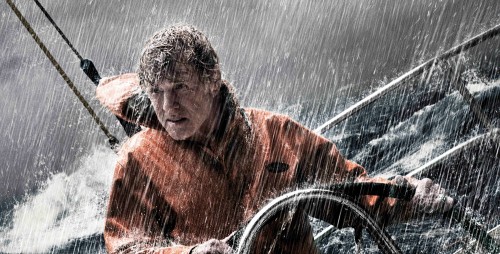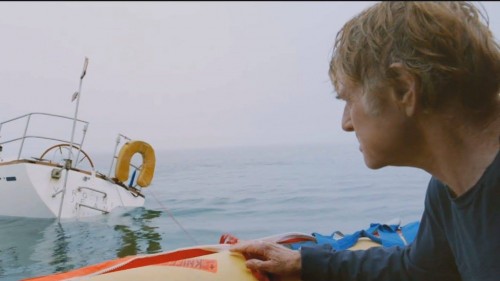
An interesting interview with the writer and director of the new, verbally-spare shipwreck film, All Is Lost, starring Robert Redford. Chandor, whose first film happened to be 2011’s Margin Call, that I now feel I need to see, talks about the Everyman who Redford portrays, a man thrown into an awareness of his own finitude before a squall. He talks about Job, and he talks about death. The entirety of the interview is worth reading, but here are a few highlights (ht SZ):
The Atlantic: In another interview, you mentioned that this movie is about you—that it’s about your feelings about mortality. How do you confront that kind of question? By making this movie, do you feel more comfortable with death?
J.C. Chandor: Yes, bizarrely. I’m hoping that’s what the audience will experience. People speak with great confidence about the ending to me, not even knowing—especially people who see the movie alone or in a small group—they don’t realize that it has a very specific message. People have very different readings on that ending, quite simply, whether he lives or dies. It’s cut down the middle. It’s kind of intense. It’s what I was hoping, but I never realized it would work quite so well. Essentially, I was hoping it would not be ambiguous for any one audience member, but there would obviously be multiple readings which you’re essentially bringing with you. Hopefully, I’ve given you enough space at that point to have your own moment.
I had a very intense near-death experience when I was quite young. I was in a horrible, horrible car crash. I had gone from no one in my family ever dying when I was around or aware of it, when I was 19, to experiencing that. One of my best friends, who was driving me in a car with my three other friends, he fell asleep on a highway. We were on a trip, and it rolled the car seven or eight times. Unfortunately, the driver passed away. I was like—slam!—confronted with believing that I was dead. It was very intense. You know, pulling myself out of the wreckage of a car, pulling myself onto the grass on the median of a highway. It was very, very intense. I had been shielded from deep, emotional thinking almost throughout my whole life up to that point.
But then over the next 20 years of my life, I started to drift away. Almost like the reverse of what normally happens. The longer I got away from that event, I started to fall back into certain traps. Both of my grandmothers died in the years prior to me writing this, and I did have a very different view and experience with that. I ended up reexamining what, at one point in my life, I was very in touch with. I had lost that. By losing touch with that, I had started to take certain parts of my own life for granted.
My feeling was that there’s something fascinating about a guy toward the end of his life, who has presumably lived a pretty good life up until that point, just—what will you do to continue to fight for those days? What is it really like when you mourn your own death?
A: Are you a religious person?
JCC: I grew up somewhat religious, going to Episcopalian church. Not in my adult life. I have mixed feelings about it. I consider myself somewhat spiritual, but not practicing.
A: I ask because I find it interesting—given how you put Robert Redford’s character, “Our Man,” through trial after trial in a way that seems very deliberately to echo Job from the Bible—that you say he is basically you.
JCC: The interesting thing to me is, that’s what the guy was searching for. This person is not going to save someone. He’s on an artificially created search for authenticity and challenge. It’s something we all strive for, in a way, and finding that while actually having it be meaningful is a really difficult path in life. The fact that the sailboat—which was one of mankind’s greatest tools for development for most of our history, and has now been left as an antique, essentially, that’s only used for joy—there is something fascinating about that. He didn’t need to be there, and yet he finds himself there. Why? Why is he forcing himself to do this?
[youtube=http://www.youtube.com/watch?v=Lk_R04LfUQU&w=600]

COMMENTS
Leave a Reply














